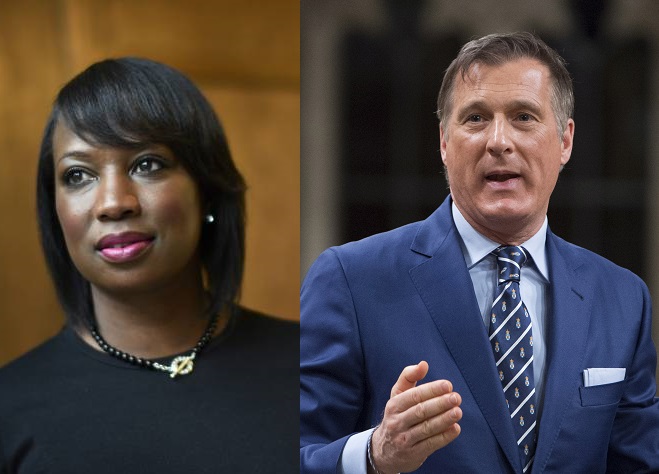Check your privilege. In the House of Commons, that used to mean, check your constitutional rights and immunities. You can’t be sued for what you said in the House; members benefit from freedom of speech, from arrest in civil actions, and can regulate their own internal affairs. To be privileged was a good thing, because it allowed for the exchange of ideas that are the cornerstones of our Parliamentary democracy.

Alas, in 2018, the word “privilege” has taken on a far different meaning. It now refers to advantages based on race, gender, ability, or orientation, characteristics over which people have no control, but which are now used to limit the ability to freely express one’s opinions. And that meaning has now seeped into our political lexicon as well, with predictably toxic results.
This week, when Conservative MP Maxime Bernier criticized the use of the term “racialized” in the recent federal budget, colleague Celina Caesar-Chavennes tweeted back, “Please check your privilege and be quiet.” The message was that because Bernier is a white male, he shouldn’t even have the right to give his opinion on the subject of race or related language.
Cue the twitter-storm, particularly from critics who felt Caesar-Chavennes had violated the very ethos of the House she sat in: free and open debate. After initially defending her position, Caesar-Chavannes later apologized and offered to meet Bernier to discuss the issue; he refused and said there was no common ground to explore. That response was as unproductive as the original slap-down, leaving the whole issue in a festering stalemate.
- Tumbler Ridge B.C. mass shooting: What we know about the victims
- Trump slams Canada as U.S. House passes symbolic vote to end tariffs
- ‘We now have to figure out how to live life without her’: Mother of Tumbler Ridge shooting victim speaks
- Mental health support after Tumbler Ridge shooting ‘essential,’ experts say
But it also raises an important question about privilege theory itself, and its impact on policy-making. Policy based on privilege theory will seek to eradicate the advantages conferred by privilege, whether by changing laws or redistributing wealth or opportunity. It also makes assumptions that all the members of a privileged group share a given advantage, or a similar experience. If that is not the case, however, then the policy it crafts will be wrong-headed, and could end up doing more harm than good.
It is true that you will not be stopped for “driving while black” if you are white; you will not be told you “run like a girl” if you are a boy; you will not be taunted for being a “faggot” if you are straight. It is also true that those experiences will negatively affect your quality of life. But it is impossible to measure the subjective effect of prejudice, because we all react to it differently. Some people will feel victimized; some will fight back; some may work twice as hard to prove the bigots wrong.
It is possible, however, to measure one objective effect: the impact of “privilege” on income. If being white, straight and male is to be privileged, then those characteristics should guarantee a higher income than for persons who are not “privileged.” And yet, statistically, that is not uniformly the case.
Sexual orientation is routinely cited as a privilege: if you are straight, you are deemed to be privileged. Yet, according to Statistics Canada, same-sex couples earn more than opposite-sex couples. “Female same-sex couples had a median total income of $92,857 in 2015, while male same-sex couples had a median income of $100,707 — the highest among all couple types. In fact, over 12 per cent of male same-sex couples had incomes over $200,000, compared with 7.5 per cent of female same-sex couples and 8.4 per cent of opposite-sex couples.” This held true not just for higher earners, but lower earners as well: “Lower income partners in same-sex couples also had higher median incomes than their opposite-sex counterparts. The median income of lower income partners was $31,192 in male same-sex couples and $30,942 in female same-sex couples compared with $24,969 in opposite-sex couples.”

WATCH ABOVE: Government making gender equality a focus in Federal Budget 2018

Get daily National news
When it comes to ethnicity, being white is also not a ticket to financial privilege. In the United States, where the census slices and dices the population in over 100 groups based on ancestry, the prototypical “white guy” (of British, Irish, or Scottish ancestry) also doesn’t see privilege translated into cash. In 2015, the top five households with the highest median income were (all U.S. dollars): Indian (South Asian) American, at $101,390; Jewish American, at $97,500; Taiwanese American, at $85,566; Filipino American, at $82,566; and Australian American, $81,452. Israeli, Russian, Greek, Lebanese and Sri Lankan households rounded out the top 10. Japanese Americans sat at 22nd place, British American, at 23rd. Chinese Americans scored 30th, German Americans, 42nd, and English Americans, 43rd. Nigerian Americans out-earned Scotch-Irish Americans, at 53rd and 54th place respectively. Ghanaian Americans out-earned Yugoslavian Americans, 61st place to 62nd.
An advocate of privilege theory might ignore these numbers and point to two glaring statistics: African American households scored 93rd, and Mexican Americans, 97th. But these facts don’t justify the singling out of white Americans as privileged, as there are many non-white groups that out-earn them as well.
And finally, if you think all women earn less than men, think again. A recent study from Denmark found that until women have children, there is no gender wage gap. Women earn as much, or in some cases, more than men. It is when they have children that the gap appears – women’s earnings drop 30 per cent and do not recover, because of the choices they make in their careers, whether to take time off, seek flexible hours, or change professions to ones that are more “family friendly.” Women without children see no drop in earnings – in other words, it’s not being a woman that creates a gender gap, it’s being a woman with kids.
So why don’t “privilege” checklists include “same-sex couples,” “South Asian households,” or “women without children” as favoured groups? Because privilege theory lumps everyone into the same category, and assumes the same outcome for each. Women are women, whether they have kids or not. Non-whites are non-whites, and must all be at an equal disadvantage. The language of “white, straight, male” privilege is thus meaningless, as are the proposed “remedies” for these “advantages.” Worse than that, the continued focus on “white privilege” is also dangerous: it tribalizes the one group that actually harbours a movement bent on violence, being white supremacy. Privilege theory is manna to hatemongers, who use it to justify their odious beliefs.
The tribalism that Bernier criticized is thus the exact opposite of what human rights advocates originally sought to achieve. Martin Luther King most famously called for a color-blind society. Of course, a privilege theorist would scold me for that reference: as a white person I cannot even quote him, because he was black. Sorry, but that is as racist as saying that King’s father shouldn’t have named him after a white Protestant reformer, Martin Luther. Ironically, both men fought the same evils: intolerance and an inability to accept diversity of thought.
One would hope that our Parliamentarians would take a page from both of them, and realize that the real privilege they have is based on their ability to speak freely, not circumscribe debate by color, creed, or personal characteristic.
Tasha Kheiriddin can be heard between noon and 2 p.m. ET on Global News Radio 640 Toronto. She’s also a columnist with Global News and iPolitics.ca, where this piece first appeared.











Comments
Want to discuss? Please read our Commenting Policy first.